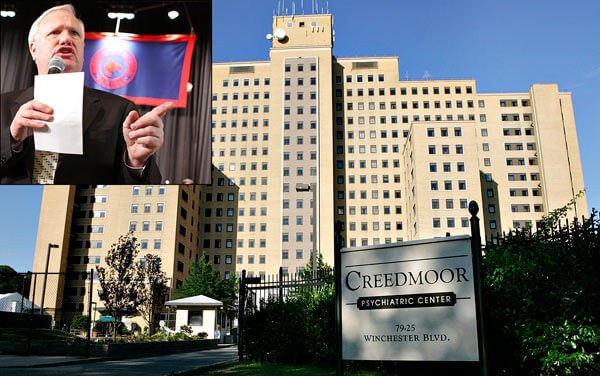By Howard Koplowitz
Inspired by the controversial sale of Creedmoor land to the Indian Cultural and Community Center, state Sen. Tony Avella (D-Bayside) penned legislation that would require the state attorney general and state comptroller to review and approve all land sales worth $100,000 and higher to private companies.
The state Dormitory Authority sold a 4 1/2-acre parcel of Creedmoor land to the ICCC, which is seeking a variance to build two nine-story senior housing towers and a community center.
The ICCC’s plans have been heavily criticized by community leaders, who say the group was not upfront about the senior housing proposal and the buildings are out of character with the surrounding community.
“Unfortunately, the lack of oversight from local governments have led to instances of favoritism and lost revenue for the state,” Avella said. “We need to eliminate loopholes that allow private entities to acquire valuable state lands at extremely discounted rates and create a form of oversight that ensures that these deals are done fairly, honestly and at a competitive price.”
Avella and community leaders questioned how the ICCC was able to acquire the land due to its dubious finances — its most recent tax returns show it ran a $29,000 deficit.
The state attorney general’s office and the state inspector general’s office are conducting investigations into the ICCC deal.
Avella’s bill requires that the attorney general and the comptroller review any sale of state-owned land when a public sale or auction is not required.
The ICCC acquired the Creedmoor land through legislation sponsored by then-Sen. Frank Padavan and former Assemblyman Mark Weprin, who now sits in the City Council.
“One of the main intentions of this legislation is to prevent any perceived or actual improper influence from an elected official pressuring state agencies or public authorities to sell state land to specific groups, at a discounted rate for political gain. There needs to be more transparency and accountability involved,” Avella said. “In the end, the taxpayers win as the state will receive more revenue and there will be more competition for available land. It will also afford local elected officials the opportunity for input and review of any proposed sale or transfer.”
Community Board 13 is currently reviewing the ICCC’s plans and is expected to decide whether it approves of a variance for the group when CB 13 meets Oct. 31.
Reach reporter Howard Koplowitz by e-mail at hkoplowitz@cnglocal.com or by phone at 718-260-4573.


































